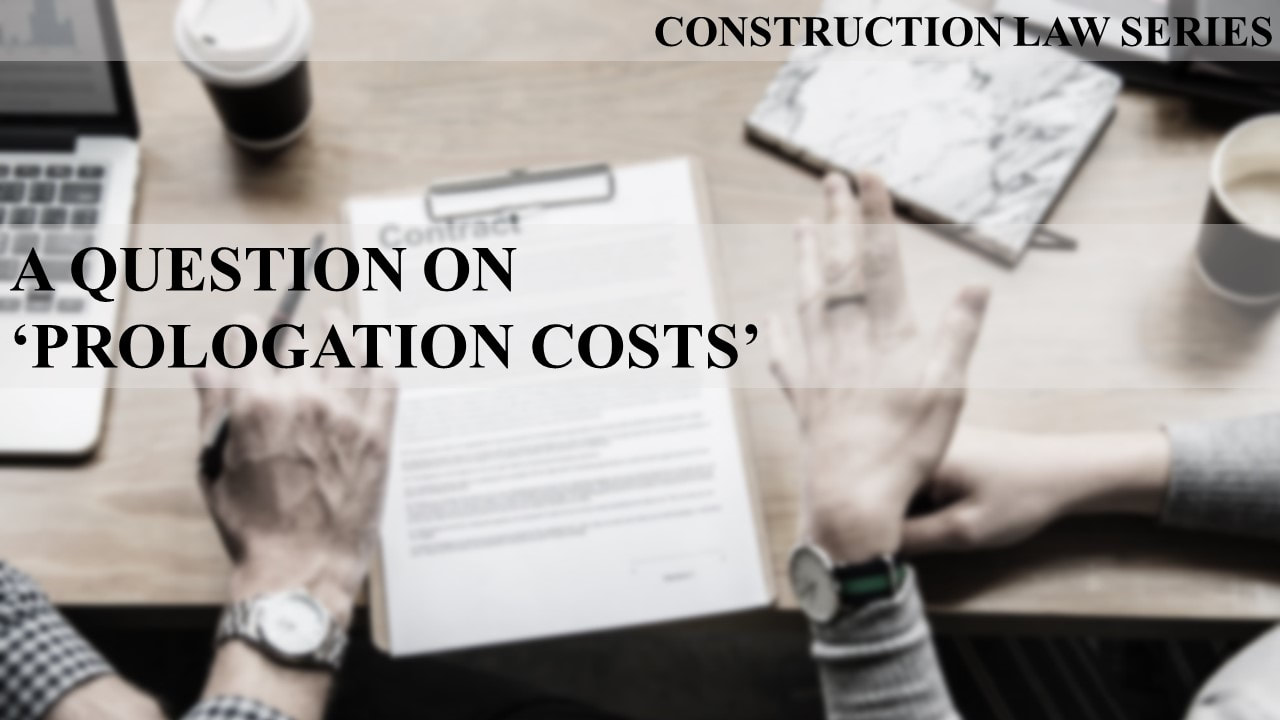A QUESTION ON ‘PROLONGATION COSTS'A question was mooted to fellows QS, “Having to consider that the contractor has now gave notice of Loss and/or Expenses L&E on the ‘prolongation costs’, how would you verify the value of Preliminaries granted in favor of the contractor?”, [Silence…]
[A moment later], one came back to say, “There are 3 parts to the Preliminaries. The first, the initial costs apply to payment such as obtaining permits and so forth, the second, the recurrent costs, such as cost of ‘maintenance of the site office’ and so forth and lastly, the final costs, inclusive of site clearance and so forth.” He furthered explained that, “While the first and last part of the Preliminaries were to be paid out in the commencement and completion of the said work, we will evaluate, as the case maybe, on the ‘prolongation costs’ by ‘dividing the number of months of EOT granted’ against the remaining of the recurrence costs and that is their entitlement.” Wait a minute, is there something amiss? You may wonder, ‘where is the prolongation costs’? ‘Prolongation costs’ is defined as ‘extra Preliminaries’ which are actually a part of the L&E arising from the EOT granted by the Architect. One may rely on an old English case of Hadley v Baxendale [1854][1] for recovering of losses based on the principle of the reasonable man’s objective and subjective test that “Where […] a contract which one of them has broken, the damages which the other party ought to receive […] may fairly and reasonably be considered either arising naturally, […]or such as may reasonably be supposed to have been in the contemplation of both parties, at the time they made the contract,[…]”, and saying such, the extra Preliminaries had to be ‘actual costs’ incurred. Such ‘complete particulars’ are required under cl.24.1(b)PAM2006/18 for L&E purposes but such was never warranted for the purpose of monthly interim claim on Preliminaries. “Dividing the number of months of EOT granted against the remaining of the recurrence costs”, is a sheer ‘breach of duty of care’ on the part of the Architect, under the advice of the QS. It hinders the contractor to collect the amount rightfully due to him, notwithstanding the fact that the principle role of the QS is to ‘evaluate’ and having said that, ‘evaluation’ derived from the core word – to ‘value’ as one may opined “[…] appointed to make a valuation, in such manner […] he may, […] decide solely by the use of his eyes, his knowledge and his skill, he is not acting judicially: he is using the skill of a valuer, not of a judge. […]”[2]. In the same vein, the Architect, having to be a ‘quasi-arbitrator’ is not a ‘valuer’ but a ‘certifier’. Would you not think he should be ‘liable in tort’ for hindering the contractor to collect the amount rightfully due to him? Contractor should be rightfully be paid the recurrence Preliminaries on a ‘pro-rata’ against the ‘contract duration’ stated in the contract, i.e. the ‘original contract period’ not the ‘amended contract duration’ arising out of any EOT. In the event of EOT, the contractor has the right to claim L&E and that include the ‘prolongation costs’ or extra Preliminaries that for the purpose of avoidance of doubt, shall be negotiated and agreed upon before acceptance of the contract. This essay is strictly for educational use only and it does not constitute ‘legal advice’ and should not be relied upon to advice clients on legal matters. ----------------------------------------------- [1] EWHC J70 [2] Clay & Dennys (Ed),Hudson’s Building and Engineering Contracts [2019 Sweet & Maxwell], 14th.Ed.p.1602.
1 Comment
David Tak Wai Yek
10/21/2020 09:32:37 pm
Another interesting read on prolongation cost in an Australian case - The Federal Court of Australia held that it will enforce a "no damage for delay" clause, even when delay occurs as a result of variation, by virtue that the framing of the clause prevented the Contractor from making a distinct claim for prolongation costs which the court also held that[…]by application of these [time-related] rates in valuing variations, the Contractor would receive payment for the prolongation of its works. [if] there were no applicable rates[…], the valuation of the variation could include a reasonable amount for time-related costs. Lucas v Anglogold Ashanti[2019]FCA1049
Reply
Leave a Reply. |
DYA+CAuthorDYA+C is set up by Ar. DAVID YEK TAK WAI to undertake resolution of commercial disputes through ARBITRATION and ADJUDICATION, specializing in CONSTRUCTION PAYMENT DISPUTES. This is an educational blog. We do not guarantee, confirm nor warrant the accuracy of the information and facts stated therein. Read at your own 'risk'.
Archives
April 2024
Categories
All
|
- Home
- About
-
Practice
-
DYA + C
-
Consultant
-
Educator
- Author I am...
- Speaking Engagement >
- Attempting Law School
- Journey in USM(Arch) >
- Discourse in Studio 6 >
-
d:KON 4
>
- Actors >
-
Acts
>
- Portraiture
- A Slice of Space Time
- Box of Installation of Lights
- Radio Misreading
- Grid of Destinies
- Shelter
- Anatomy of Pain
- Tensigrity of Ego
- Of Prisons and Walls
- Forest of Nails
- Curtain of Fears
- Dissolution of the Ego
- If it's Ain't Broken it's Ain't Worth Mending
- Flight of Freedom
- Cross of Complexity and Contradiction
- interrogation
- Stage >
- Play
- Approach
- Galleria >
- External Critique >
- Philosophy
- Codes Regulations & Standards >
- Photo Essays
- Contact


 RSS Feed
RSS Feed
